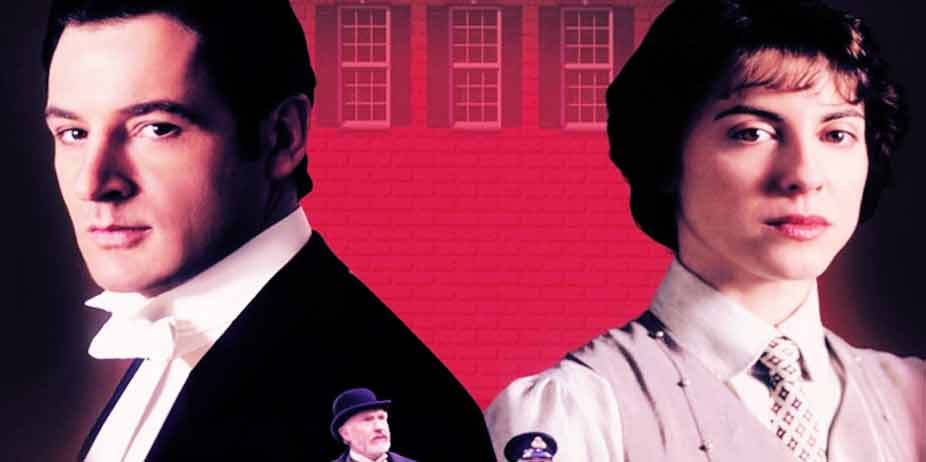 The
Winslow Boy (1999)
The
Winslow Boy (1999)
The stage is set, the actors poised, and the curtain about to raise. Set in the London of 1912, The Winslow Boy is a timeless classic for those who long for the dramatic yet cannot stomach violence or an over-abundance of suspense. Our story opens with the announcement that Catherine Winslow (Rebecca Pidgeon) has become engaged to John Watherstone, a young military commander. Her father, of course, interrogates John and at last agrees to the match providing John can take care of his daughter well.
This arrangement is spoiled by the homecoming of Ronnie (Guy Edwards), who hides from his father the fact that he has been expelled from the Navel Collage for stealing and cashing a five pound note. When Arthur Winslow (Nigel Hawthorne) does discover this he solemnly takes his youngest son aside and asks him if it is true. Ronnie says no, that he didn't steal it. Arthur asks again and again the answer is no. Completely certain of his son's honesty, Arthur then attempts to hire in Ronnie's defense the most prominent lawyer in London, Sir Robert Morton, despite their dwindling funds.
Catherine is adamantly against this due to her involvement in a suffragette movement; Sir Robert (Jeremy Northam) has made it quite clear he is against "feminists." Of course she finds him arrogant and willing to pull any scam to win his case. The family is at first turned off by Sir Robert as he interrogates Ronnie clearly demanding that the boy tell the truth and admit that he did steal the five pound note and cash it. Ronnie is distraught but sticks to his story. Catherine is infuriated with Sir Robert's arrogance. Her father believes they have lost their only chance to defend Ronnie's honor. But as Sir Robert takes his leave, he says, "Yes, I will take the case -- the boy is clearly innocent!"
The Winslows are thrown full-force into proving Ronnie's innocence against a court stacked against them. It is not taken well by the press and crowds gather outside the house. John Watherstone breaks off his engagement to Catherine because if he doesn't his father will cut off his inheritance. Our heroine finds herself constantly doubting Sir Robert's authority due to her prejudice as a suffragette. The family is also in dire financial trouble... which is worth more? All they have worked for over the years, the status and importance they have built in society... or the determination that "let right be done" despite the consequences? This film is interesting, to say the least. At times humorous, always thought-provoking, its single flaw lies in the setting. Drama is well-mixed with colorful characters, believable situations, and even a laugh here and there. It teaches us a wonderful lesson... that no matter what the consequences, one should stand up for what one believes and "Let right be done!"
But still the film cannot shake the "play setting" mentality with limited sets and darkly-lit rooms. If the director had taken the characters outside more, or at least shown us different aspects of the houses themselves, the audience would have gotten a better feel for the Winslow case. The arrogance displayed in Mamet's bragging on the film makes the flaws all the more obvious... namely the period costuming, which is all wrong in Catherine's case. (Hip waistlines weren't en vogue until the 1920's, not 1912. They should have taken a hint from Titanic if nothing else.) David Mamet also has a history of leaving loose ends. Now whether or not the flaw lies in his translation of the production or the original script itself cannot be known, but more interested viewers will note several minor plot holes or unexplained mysteries. Additionally he chooses to leave out the climatic courtroom scene, which makes the ending utterly flat. The British are withdrawn, true, but not languid to the point of showing no excitement whatsoever. The casting is not all bad with the exception of an actress whose butchery of the lines is intolerable; the only truly magnificent performances come from Jeremy Northam as the emotionally-withdrawn Sir Robert, and Nigel Hawthorne as Lord Winslow.
Thus said, the value of the lessons learned make up for the flaws in the film itself... trust, love, and the idea that first impressions are not always correct. Catherine finds that despite Sir Robert's apparent arrogance, this case means a great deal more to him than he would admit. The last scene between them is magnificent. These two characters have verbal battles throughout the film and it's hilarious to hear them argue about women's suffrage one moment and cunningly flirt the next in a contemporary battle of the sexes. But Sir Robert's last line tops the film and left me in stitches... as well as dreaming up what the future would hold. The Winslow Boy is rated G and is generally good family viewing. My only cautions are a few uttered uses of "Lord" and the fact that almost every character smokes... in most of the scenes. Understandably, the English in the early nineteen hundreds did smoke. It won't keep the attention of children or James Bond fans, but it's clean, and well worth your time.
